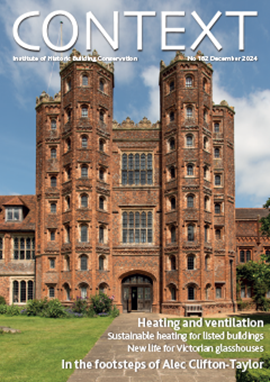IHBC accreditation recognised by Construction Skills Certification Scheme (CSCS)
Contents |
[edit] Interdisciplinary IHBC accreditation recognised by Construction Skills Certification Scheme
The Construction Skills Certification Scheme (CSCS) has recognised IHBC’s professional accreditation (Full and Associate Members) and support (CPD etc.) in awarding its Professionally Qualified Person (PQP) cards.
Chris Wood, IHBC Education Committee Chair said: ‘We are delighted that the IHBC’s accreditation has achieved this core standard of recognition. This confirms that the IHBC’s own regulatory procedures and advocacy in interdisciplinary conservation practice stand squarely alongside those familiar in more traditional disciplines and practices, from archaeology to architecture and design to planning."
IHBC Director Seán O’Reilly said: "This new recognition applies only to the IHBC’s accredited members: Full members, who are conservation accredited in interdisciplinary conservation practice, and Associates, who are conservation accredited typically in IHBC practice areas related to their primary discipline… now formal acceptance at the highest levels…The regulatory development seen here means that there is now formal acceptance at the highest levels in the construction sector of the kind of interdisciplinary practice that the IHBC promotes and regulates."
[edit] Construction Skills Certification Scheme writes:
CSCS cards provide proof that individuals working on construction sites have the appropriate training and qualifications for the job they do on-site. By ensuring the workforce is appropriately qualified the card plays its part in improving standards and safety on UK construction sites.
Holding a CSCS card is not a legislative requirement. It is entirely up to the principal contractor or client whether workers are required to hold a card before they are allowed on site. However, most principal contractors and major house builders require construction workers on their sites to hold a valid card….
The PQP card is available to competence-assessed members of CSCS-approved Professional Bodies and is valid for five years. All applicants must pass the CITB Managers and Professionals Health, Safety and Environment Test.
[edit] Application details
Applicants will need to supply proof that they hold current membership of the professional body at a level accepted by CSCS, by providing one of the following (please note that membership is required to be renewed annually and the below evidence must confirm membership for the current calendar year and the level of membership held):
- A membership certificate (which shows membership for the current calendar year)
- A membership card (both sides, confirming membership for the current calendar year)
- An up-to-date letter or email from the professional body confirming membership for the current calendar year
- A receipt of payment for membership for the current calendar year.
This card cannot currently be renewed and once expired must be applied for as a new card application. The quickest and most convenient way to apply for a CSCS card is via the online application service.
- See: Construction Skills Certification Scheme | Official CSCS Website – HS&E test and exemptions
- See more background on the CSCS
- See more on the PQP card
This article was first posted as 'Good news for #IHBC25: Interdisciplinary IHBC accreditation recognised by Construction Skills Certification Scheme (CSCS) for Professionally Qualified Person (PQP) cards' on the IHBC news blog on May 10,
--Institute of Historic Building Conservation
[edit] Related articles on Designing Buildings
- Architects Registration Board.
- Build UK.
- CDM.
- Construction apprenticeships.
- Construction Industry Training Board.
- CSCS verification app.
- Gangmaster.
- Glazier.
- Health and safety.
- IHBC articles.
- Industry placement CSCS card to help learners into construction.
- NSCC.
- Royal Institute of British Architects.
- Royal Institution of Chartered Surveyors.
- Safety helmet colours.
- Site inspector.
- TESP calls for industry mentors.
- Understanding mental health in the built environment.
IHBC NewsBlog
200th Anniversary Celebration of the Modern Railway Planned
The Stockton & Darlington Railway opened on September 27, 1825.
Competence Framework Launched for Sustainability in the Built Environment
The Construction Industry Council (CIC) and the Edge have jointly published the framework.
Historic England Launches Wellbeing Strategy for Heritage
Whether through visiting, volunteering, learning or creative practice, engaging with heritage can strengthen confidence, resilience, hope and social connections.
National Trust for Canada’s Review of 2024
Great Saves & Worst Losses Highlighted
IHBC's SelfStarter Website Undergoes Refresh
New updates and resources for emerging conservation professionals.
‘Behind the Scenes’ podcast on St. Pauls Cathedral Published
Experience the inside track on one of the world’s best known places of worship and visitor attractions.
National Audit Office (NAO) says Government building maintenance backlog is at least £49 billion
The public spending watchdog will need to consider the best way to manage its assets to bring property condition to a satisfactory level.
IHBC Publishes C182 focused on Heating and Ventilation
The latest issue of Context explores sustainable heating for listed buildings and more.
Notre-Dame Cathedral of Paris reopening: 7-8 December
The reopening is in time for Christmas 2025.
Stirling Prize-winning Salford building to be demolished
The Centenary Building will be bulldozed as part of the wider £2.5bn Crescent regeneration project.
















